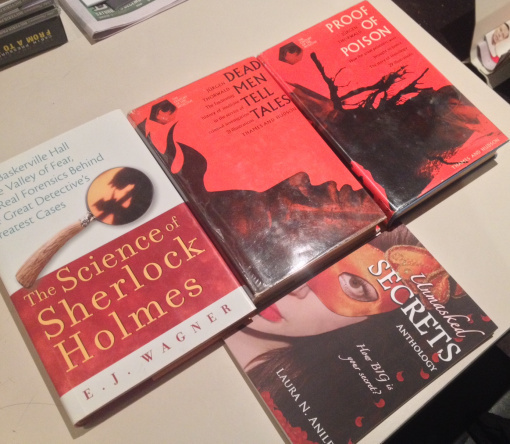Narrelle M. Harris's Blog, page 31
June 20, 2017
Review: Resisting Miss Merryweather; Trusting Miss Trenthem; Claiming Mister Kemp by Emily Larkin
Catching you all up with some of my Happy June reading, because part of it was catching up with all the Baleful Godmother stories by Emily Larkin I hadn’t yet read before launching into Ruining Miss Wrotham!
I’ve already said how much I loved the first in the series, Unmasking Miss Appleby, and I’ve also read The Fey Quartet, which follows the stories of Maythorn Miller and her three daughters, the progenitors of the faerie gift that keeps on giving.
When Ruining Miss Wrotham came out just when I needed a happy book, I gobbled it up pretty quickly, and then went back to the intervening tales – Resisting Miss Merryweather, the second in the series, is a novella, as is #4, Claiming Mister Kemp – and it was seeing that the series included an M/M romance that made me keen to see what Larkin was going to do with it all.
 Resisting Miss Merryweather
Resisting Miss MerryweatherIt is a truth universally acknowledged, that Faerie godmothers do not exist.
Thus proclaims the facing page of each of the Baleful Godmother series, just before launching into a story where a woman descended from Maythorn Miller’s three daughters either has received, or is about to, her faerie gift from a resentful Faerie queen. These women must choose well, or risk madness and death. Even when they have a gift, life isn’t necessarily made easy.
In this novella, following up on Unmasking Miss Appleby, we meet Anne Merryweather – known as Merry to her family and friends – and her encounter with Barnaby Ware.
Ware is on his way to meet his estranged friend Marcus Cosgrove and his new wife – none other than the Charlotte Appleby of the previous book! Barnaby is grappling with the way he cuckolded Marcus with Marcus’s devious first wife, and is unable to forgive himself although his friend is certainly ready to forgive him. But that betrayal means that Barnaby doesn’t think he’s fit for love. He thinks he’s irredeemable. Merry thinks he’s wrong, and sets out to prove it.
Readers of the first book in the series will know what Marcus’s betrayal was, and how he was not entirely to blame. He’s a very hangdog character for a while, though it’s easy to see his more admirable qualities. Fortunately, Merry – Charlotte’s cousin, whose father was a dancing master and her mother a noblewoman – has got plenty of joie de vivre for them both.
An accident while exploring a cave brings all these unhappy events and unresolved guilt to a head. Between Marcus and Charlotte Cosgrove, the sparkling Merry (and her imminent Faerie gift), self-respect, trust and hope are restored, love is declared and happiness ever after is achieved. It’s a charming, snappy, happy read. Just the ticket for #happyjune.
 Trusting Miss Trentham
Trusting Miss Trentham
With Trusting Miss Trentham, Larkin goes back to a full length novel to tell the story of Letitia Trentham, a wealthy heiress, still unmarried because she’s turned down every offer of marriage ever made to her. She already has her faerie gift, you see. She can tell truth from lies, and no man has ever wanted to marry her for love. Only for her wealth.
She’s resigned herself to never knowing love when Icarus Reid comes into her life. Reid is a former soldier, traumatised by dreadful events at the Battle of Vimeiro. All he wants from Letty is for her to use her unusual ability to find out who betrayed him and his scouts before the battle – who is responsible for the deaths of his comrades and something worse that happened to him.
Letty finds herself challenged out of her ladylike comfort zone, pretending to be someone she’s not, doing things she never thought a lady would do, to find out who betrayed this troubled man, and perhaps bring an end to his nightmares.
Letty is lovely – a woman who is profoundly tied to the necessities of truth, who finds herself committing little falsehoods in pursuit of helping this emotionally scarred war veteran. She learns about herself and the sometimes too honest Reid, including his darkest secrets. For all that she’s so aware of how much lying people do, she’s kind, spirited and will always stand up for those who need protection. Especially if they’ve been unjustly accused of wrongdoing. She, after all, can tell if they’re innocent.
I loved the way Larkin explored Reid’s experience of PTSD, long before the term was ever applied to traumatised survivors. I also loved the attention she paid to creating Letitia Trentham, who has endured a lifetime of disappointments in men who don’t see her, only the way her wealth can give them ease and repay their debts. Instead of being bitter, Letty is strong and kind. Her determination to find the truth of what happened in France, motivated by compassion, is a nice counterpoint to Reid’s more despairing need to find the truth. His slow recovery is well handled – not too pat. Letty’s connection with and love for him can’t save him, but she can help show the way to safety at last.
I enjoyed the crossovers hinting at events in the next book in the series – Claiming Mister Kemp – so that the series is loosely tied together by more than the theme. We even get to meet Barnaby and Merry Ware again!
There’s grit and pain in Icarus Reid’s story as he confronts people on the trail of the traitor, but there’s also hope and redemption, led by Letty’s kind but not naive heart and mind.
 Claiming Mister Kemp
Claiming Mister Kemp
There was so much to love about this novella, but I confess I found it occasionally uncomfortable. Being set in the regency period, attitudes to homosexuality were naturally going to affect the storyline and the way in which Lucas and Tom interacted.
Lucas Kemp’s twin sister has recently died, and he’s still overcome with grief. When his childhood friend Thomas Matlock returns from the war in France in which he came too close to death, Tom’s decides to act on his love for Lucas, which he is certain is reciprocated.
It is, and we know it is from early on, but Lucas is also struggling with shame about his desire for Tom, as well as all the grief he bears from the loss of his beloved sister Julia.
In so many ways this is Larkin’s usual charming, witty love story, with just a touch of the magic that is such a feature of the other stories in the series. The nature of Lucas’s discomfort with his desire, however, means some of the intimate scenes with Tom are what might be tagged ‘dubious consent’. Tom sometimes pushes past Lucas’s “no” and it later becomes a “yes” but I confess a preference for clear consent. Tom promises never to push Lucas beyond what he wants, but he skates very close to and occasionally over that line for my preferences.
But Lucas’s heart is definitely saying yes, even if his brain is throwing up walls, so ultimately, they work themselves out and even find they have the support of family who just want them to be happy.
That unreconciled discomfort I feel is at least counterbalanced with some loving scenes, some wonderful crossover moments with the preceding book, Trusting Miss Trentham, and after trials and anguish the happy ending.
I hope Emily Larkin continues to write love stories for all kinds of people, and I’m very much looking forward to #6 in the series, Discovering Miss Dalrymple.
Reading Miss Larkin
Visit Emily Larkin’s website – where you can join her mailing list and get The Fey Quartet and Unmasking Miss Appleby for free.
Buy:
Resisting Miss Merryweather
Resisting Miss Merryweather[image error] (Amazon)
Resisting Miss Merryweather (iBooks)
Resisting Miss Merryweather (Kobo)
Resisting Miss Merryweather (Nook)
Trusting Miss Trentham
Trusting Miss Trentham[image error] (Amazon)
Trusting Miss Trentham (iBooks)
Trusting Miss Trentham (Kobo)
Trusting Miss Trentham (Nook)
Claiming Mister Kemp
Claiming Mister Kemp[image error] (Amazon)
Claiming Mister Kemp (iBooks)
Claiming Mister Kemp (Kobo)
Claiming Mister Kemp (Nook)
Ruining Miss Wrotham
Ruining Miss Wrotham
 (Amazon)
(Amazon)Ruining Miss Wrotham (iBooks)
Ruining Miss Wrotham (Kobo)
Ruining Miss Wrotham (Nook)
June 15, 2017
Review: The Wizardry of Jewish Women by Gillian Polack
 I’m still reading only happy books for June, but a thing that made me happy recently was discovering that Gillian Polack’s The Wizardry of Jewish Women was getting a reissue with a new publisher!
I’m still reading only happy books for June, but a thing that made me happy recently was discovering that Gillian Polack’s The Wizardry of Jewish Women was getting a reissue with a new publisher!
The book was originally published by Satalyte Publishing, but not long after it was launched, the press had to close down. As the book was no longer available, I decided not to review it and frustrate anybody who wanted to get hold of it.
But now it’s available again as an e-book through Bookview Cafe, a cooperative publisher run by authors from across a range of genres. Bookview Cafe’s authors include Katharine Kerr, Vonda N. McIntyre and Ursula Le Guin, so you know they’re onto something.
I’m so pleased Wizardry is available again because I loved it. I’ve enjoyed Gillian Polack’s intriguing blend of the everyday and the magical before, in The Time of the Ghosts, Ms Cellophane, and The Art of Effective Dreaming.
The Wizardry of Jewish Women – the blurb
Pink tutus, sarcasm, amulets and bushfires: that is suburban fantasy in Australian cities. It is magic.
Life is never quite what it seems, even without the lost family heritage delivered to Judith and Belinda in boxes.
Judith (who owns the haunted lemon tree and half the boxes) wants an ordinary life. Mostly.
Belinda wants to not be so very worthy. If Belinda weren’t Judith’s sister, and if it wasn’t for bushfires and bigots, Belinda’s life would be perfectly ordinary. Judith will tell you so. You don’t even have to ask.
Belinda’s friend Rhonda has a superpower. Each time she sees the future or reveals deep secrets, seekers for the ‘New Nostradamus’ come closer to destroying her life. Her hold on normalcy is very fragile. So is her hold on safety.
Judith and Rhonda are haunted, Judith by her past and Rhonda by her gift of prophecy. Will they ever come into the sunshine and find happiness?
The review
The Wizardry of Jewish Women is primarily set, like The Time of the Ghosts and Ms Cellophane, in Canberra. It seems an unlikely city, full as it is of bureaucracy, windswept suburbia and a reputation for Olympic Level Mundanity – but it’s one of Polack’s special skills to taken what seems to be a grey surface and fill it with subtle colour and disturbing undercurrents. It certainly makes me see my old hometown in new lights when I visit.
The story begins when Judith and her sister Belinda inheret a box from an apparently disreputable grandmother and discover a scrap book of hidden Jewish magic, recorded in a kind of hidden message. Their histories and their actions with the book’s contents are obscurely bound up with those of Rhonda, whose prophetic insights have turned her into a recluse.
Each woman faces domestic difficulties as well as wider threats, from the very real-world danger of Australian bushfires and oppressive exes, to the more creeping, opaque threats of lurking but tangible evil and the consequences of magic.
Polack weaves an inexorable web of subtle detail and slow reveals. What begins in humble Australian suburbia, populated with middle aged women who are agitated with where they are in life and the family and friends that surround them, has the oddness creeping in before long. Small strangenesses, fleeting discomforts, hints of threat and threads of something sinister build and build until protagonist and reader both are confronted with the need for action.
The Wizardry of Jewish Women is a fine example of Polack’s skill with this kind of world-building, taking us from intimate domestic life and troubles to the still-intimate peculiarities of her finely drawn characters’ intersections with magic and devilry.
Along with all the virtues of the writing and tone as a well-crafted piece of fiction, the book springs from an Australian experience that departs from the mainstream, inspired as it is by Polack’s own Jewish heritage and experiences. It’s woven from more diverse cultural threads than the usual Aussie milieu and offers a richer, deeper view of Australian culture and experience as a result.
Wryly humorous, very human and steeped in both suburbian realities and fantastical strangeness, The Wizardry of Jewish Women moves from quietly engaging to absolutely gripping before reaching its satisfying conclusion.
It’s a fabulous little book. You should read it.
Get The Wizardry of Jewish Women in Mobi or Epub formats at Bookview Cafe.
June 4, 2017
Review: Fake Geek Girl by Tansy Rayner Roberts
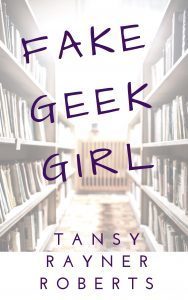 As mentioned in my review of Ruining Miss Wrotham, I’m on a kick of reading only happy books for the month of June, as an antidote to the bleakness of the world and some deeply disturbing and unhappy books I’ve read in the first half of the year.
As mentioned in my review of Ruining Miss Wrotham, I’m on a kick of reading only happy books for the month of June, as an antidote to the bleakness of the world and some deeply disturbing and unhappy books I’ve read in the first half of the year.
Along with more of Emily Larkin’s Baleful Godmother series, which I’ll review a bit later, I pounced last weekend on some short fiction by one of my favourite writers, Tansy Rayner Roberts.
Roberts has some fantastically fun short story series going on at present, including the Castle Charming series (Glass Slipper Scandal is the first one of those) and the Belladonna University stories, the first of which is Fake Geek Girl.
The Fake Geek Girl of the story is a rock band, headed by the charismatic Holly, who writes songs inspired by the geeky life of her twin sister Hebe despite the fact Holly doesn’t really get the geek life. The songs are ironic. Possibly. The band’s drummer, Sage, is Hebe’s ex.
They’re all good friends – though cracks are starting to appear as Sage frets that Holly’s about to break up the band to go solo. Fellow bandmember, Juniper, has her own set of issues, Sage and his uni flatmates are looking for a new roomie, Hebe might like a guy she’s met if he’ll stop mistaking her for her sister, and Holly might be hooking up with an awful ex.
The action is set at Belladonna University, which splits its curriclum between the Real (that is, magic studies) and the Unreal (which is mundane stuff like engineering).
The tale unfolds with characteristic energy, sharp wit and cracklingly good characterisation. If it wasn’t enough that I adore the writing, in this book everyone has agency, the narrative boldly tramples over stereotypes and cliche, and it flings a bucketful of glittering fresh narrative confetti everywhere. To put the fruit-and-feather Carmen Miranda bonnet on top of the glory cake, Fake Geek Girl ends with a song lyric that makes want to sing. It speaks to my heart, no lie.
Actually, a while back, as a result of supporting Roberts’ Patreon, I read the second of the Belladonna University stories, Unmagical Boy Story, before I got to this one. It didn’t harm the reading of this book, which contains a reference to the characters who appear in Unmagical Boy Story. I am very thrilled to see, however, that the third Belladonna University story, The Bromancers, is currently being podcast on the Patreon. Soon it shall be released in ebook form and it shall be mine, I tell you, miiiiiiiiiiiiiine.
In conclusion: if you’d like a happy read, for the month of June or at any other time, the Belladonna University series, starting with Fake Geek Girl, is right up there in glitter and song. It’s a positively joyful thing.
Buy Fake Geek Girl at Review of Australian Fiction
Get Fake Geek Girl (and Glass Slipper Scandal!) from Instafreebie.
Support Tansy Rayner Roberts’ Patreon (and get access to podcasts of her stories and new short works as they become available!)
By the way, I’m all ears for Happy Reads. If you have any recommendations for books that fit the bill, leave a comment!
June 2, 2017
Review: Ruining Miss Wrotham by Emily Larkin
 Ruining Miss Wrotham is the fifth in Emily Larkin’s Baleful Godmother historical romances. Like the splendid Unmasking Miss Appleby before it, it’s set in the Regency period and follows the story of a descendent of a woman who used a faerie wish to grant her female descendents a wish of their own on a significant birthday. Wishes are always granted but are not always wisely chosen – this faerie godmother is baleful indeed. Some wishes for faerie gifts end in madness and death.
Ruining Miss Wrotham is the fifth in Emily Larkin’s Baleful Godmother historical romances. Like the splendid Unmasking Miss Appleby before it, it’s set in the Regency period and follows the story of a descendent of a woman who used a faerie wish to grant her female descendents a wish of their own on a significant birthday. Wishes are always granted but are not always wisely chosen – this faerie godmother is baleful indeed. Some wishes for faerie gifts end in madness and death.
I went ahead to read Ruining Miss Wrotham without first reading the intervening books of the series, but it interfered with my enjoyment not a single jot. This story is as well crafted and energetically paced as the first, with crisp characterisation, wonderful wit and rich period detail, yet all with a modern sensibility. No swooning heroines here, and the heroes are strong and kind.
The Blurb
Eleanor Wrotham has sworn off overbearing men, but she needs a man’s help—and the man who steps forward is as domineering as he is dangerous: the notorious Mordecai Black.
The illegitimate son of an earl, Mordecai is infamous for his skill with women. His affairs are legendary—but few people realize that Mordecai has rules, and one of them is: Never ruin a woman.
But if Mordecai helps Miss Wrotham, she will be ruined.
Ruining Miss Wrotham follows Eleanor – otherwise known as Nell – as she tries desperately to find her sister, who really is a ruined woman, having run off with a soldier when she was fifteen. Sophia’s ruin has tainted Nell as well, ending her engagement to Roger, Earl of Dereham. Abandoned by their father, Sophia has been left fending for herself, and her letters to her sister have been intercepted and destroyed.
But Nell has finally received a long-delayed letter from her sister, and she’ll do anything she must to save her. But it’s still a week until her 23rd birthday, when she’ll wish for the faerie gift of being able to find people. Until then, she’s relying on Roger’s cousin, Morcedai Black, the illegitimate son of the previous Lord Dereham, because a week might be too long.
Nell learns that, despite his reputation as rake, Mordecai Black is a decent man, and though he’s had lovers he has never ruined a woman. He’s also in love with Nell’s vivacity and repressed penchant to be unconventional, but his proposal is rejected because she finds him dictatorial. She’s had quite enough of men telling her what to do.
But she’s falling for him too, and decides that if she’s ruined by association anyway, what would it matter to take the next step?
Ruining Miss Wrotham takes our characters across England and too unsalubrious parts of the world in the desperate search for Sophia and her baby. It also takes Nell and Mordecai through their own histories and growing connection, through danger and the arrival of the faerie gift, which doesn’t go as planned.
It’s an emotional ride, but with the comfort of knowing it will arrive at a happy ending. It was a much-needed balm after I’d finished reading the dark and depressing The Handmaid’s Tale and The Little Stranger in the weeks before.
Ruining Miss Wrotham has launched my Month of Reading Happy Books as an antidote to the preceding two and the state of the world generally, and I couldn’t have made a better choice!
Get Ruining Miss Wrotham
Ruining Miss Wrotham [image error] (Amazon)
Ruining Miss Wrotham (iBooks)
Ruining Miss Wrotham (Kobo)
Ruining Miss Wrotham (Nook)
May 2, 2015
Clunes Booktown 2015
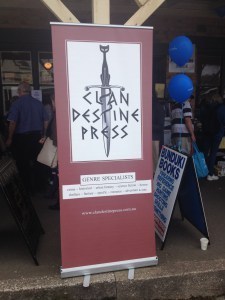 After missing Booktown last year, it was lovely to get to Clunes today for my third Booktown festival. I caught the special service train that VLine put on for the festival and spent the day helping out at Clan Destine Press’s table, talking about books and wandering among the bookstalls.
After missing Booktown last year, it was lovely to get to Clunes today for my third Booktown festival. I caught the special service train that VLine put on for the festival and spent the day helping out at Clan Destine Press’s table, talking about books and wandering among the bookstalls.
Fellow Clan Destine author Jane Routley, dressed strikingly for the day and cut an elegant figure on the main street of Clunes, handing out postcards for her book and directing people towards our table.
Clunes likes to put on a bit of a show for the punters, and there were roaming performers reciting Shakespearean speeches in the morning, and a juggler/magician (who is a regular here) and the delightful Creswick Brass Band, who provide a musical soundtrack for the day which I always enjoy.
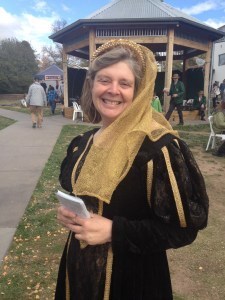 I also poked around a few of the bookshops – which is what you do when you come to Clunes Booktown. To tell the truth, I love just loitering around the main street, watching all these people who’ve come to this little rural Victoria town for the joy of books, even without going bookhunting myself.
I also poked around a few of the bookshops – which is what you do when you come to Clunes Booktown. To tell the truth, I love just loitering around the main street, watching all these people who’ve come to this little rural Victoria town for the joy of books, even without going bookhunting myself.
Still – you can’t come to Booktown without scoring an excellent book or four, and I was delighted to find some great books relating to 19th century forensics and toxicology (which I need for a new book idea). I also picked up a little book from a small press that looked intriguing.
Booktown is still on tomorrow, so you can drive up or catch a VLine train to Ballarat to meet one of the special Clunes trains.
Go, fly, be free, and find beautiful books!
Narrelle M Harris is a Melbourne-based writer. Find out more about her books, smartphone apps, public speaking and other activities at��www.narrellemharris.com.


April 19, 2015
Writing short stories vs novels by Amanda Pillar
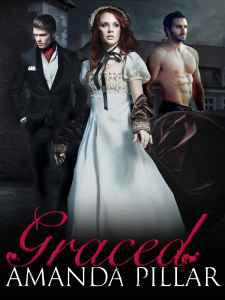 This week, Amanda Pillar is my guest! Amanda’s new novel, Graced, has just been released, but she’s�� written mainly short stories until now.�� Today she talks about the difference between the two.
This week, Amanda Pillar is my guest! Amanda’s new novel, Graced, has just been released, but she’s�� written mainly short stories until now.�� Today she talks about the difference between the two.
I began writing back to front. Rather than tackle the shorter and more attainable short story, I started with a novel. I spent hours tapping away at my 386 computer, painstakingly crafting a derivative and unimaginative first person fantasy that thankfully never saw the light of day. In fact, it was several (short) novels later that I wrote my first short story.
Looking back, I���ve been writing short stories for longer than I initially realised. Whenever we had creative writing at high school, I���d use my 500 word essay to write about vampires or witches or something magical, much to the annoyance of my year 10 teacher, who wanted me to write something else. But I persisted. In fact, one of my high school essays became one of the first short stories I ever had published.
It was at this point that I realised I needed to put the novels aside and work on my short fiction. I���d gone about getting published the wrong way; at least that���s what I thought at the time. I���d shopped my second novel around to publishers (agents, what were they?) and had received good feedback, but I was missing something. What, they couldn���t say, and I didn���t know. So I decided to refine my craft.
Writing short stories taught me that they were hard. In a novel, the reader is a bit more forgiving if you take a few pages to flesh out the character; in a short story, you have a couple of paragraphs. And yet, my novel writing had taught me how to develop a character, how to learn all their ins and outs. So this helped. I approached short stories with fully formed characters.
Short stories also taught me that the first sentence is paramount; the hook really is vital. Just as important as the following paragraphs. Every word in a short story has to count. Superfluous words are the enemy; there���s more lenience in novels for that kind of thing. That���s where your adverbs and ���filter��� words really hurt.
And then I tried to write flash fiction. If anything, that is even more difficult. 1,000 words or less to make a reader 1) care about your character, 2) develop a plot and 3) have a conclusion. 1,000 may sound like a lot, but when you start out writing novels, 1,000 words is nothing. It���s often less than most opening chapters!
I then began editing as well. This helped my writing more than some might realise. It���s easy to pick out the errors in other people���s work, but it also made me realise some of the very common issues I kept noting I was guilty of, too. And so I began to look at each short story of my own more critically.
Then I went back to writing novels.
The hardest transition between the two is for me is pacing. And yet writing short stories means that every chapter I write in novel hopefully begins in a punchy way and ends with a conclusion of some sort, whether it be cliff-hanger or resolution. Every word in my novels now counts in a way it didn���t previously.
So for me, I think my roundabout way of going from novel writing to short stories and back again has taught me more about character development, plotting and word use than I may have achieved going from short stories to novels, but then, I���ll never really know. I just know that I love writing both.
About Graced:
City Guard Elle Brown has one goal in life: to protect her kid sister, Emmie. Falling in love ��� and with a werewolf at that ��� was never part of the deal.
Life, however, doesn’t always go to plan, and when Elle meets Clay, everything she thought about her world is thrown into turmoil. Everything, that is, but protecting Emmie, who is Graced with teal-colored eyes and an unknown power that could change their very existence. But being different is dangerous in their home city of Pinton, and it’s Elle’s very own differences that capture the attention of the Honorable Dante Kipling, a vampire with a bone-deep fascination for a special type of human.
Dante is convinced that humans with eye colors other than brown are unique, but he has no proof. The answers may exist in the enigmatic hazel eyes of Elle Brown, and he’s determined to uncover their secrets no matter the cost…or the lives lost.
Buy Graced:
Graced
 Amazon.com
Amazon.comGraced Amazon.co.uk
Graced �� Barnes and Noble
Graced Google Play
Graced iBooks
Graced Kobo
About Amanda:
 Amanda Pillar is an award-winning editor and author who lives in Victoria, Australia, with her husband and two cats, Saxon and Lilith. Amanda has had numerous short stories published and is working on her eighth fiction anthology. Graced is her first novel. By day, she works as an archaeologist travelling around Australia.
Amanda Pillar is an award-winning editor and author who lives in Victoria, Australia, with her husband and two cats, Saxon and Lilith. Amanda has had numerous short stories published and is working on her eighth fiction anthology. Graced is her first novel. By day, she works as an archaeologist travelling around Australia.
Amanda Pillar’s website
Follow @amanda_pillar on Twitter
Narrelle M Harris is a Melbourne-based writer. Find out more about her books, smartphone apps, public speaking and other activities at www.narrellemharris.com.


March 20, 2015
Adulting like a pro
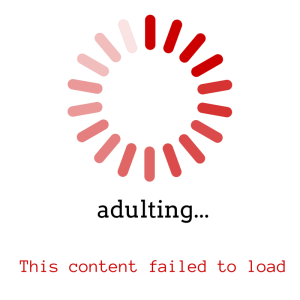 I know I go on a bit about the correct use of language, but I’m not a complete stick-in-the-mud. Language evolves, I know. New words come in, archaic ones get shown the door and you only need to know them when you’re reading Austen or Conan Doyle or Shakespeare.
I know I go on a bit about the correct use of language, but I’m not a complete stick-in-the-mud. Language evolves, I know. New words come in, archaic ones get shown the door and you only need to know them when you’re reading Austen or Conan Doyle or Shakespeare.
For all that, I’m very fond of the dynamic way language is thrown about and sometimes stretched into weird shapes in contemporary language – particularly in online communities. As long as the use (or misuse) communicates the intended message, turning an adjective into a noun or vice versa can add a robust energy to an observation or exchange. I like language to be fun and full of energy. I like it to surprise and delight me.
Not every new word is a delight, of course. I was recently introduced to ‘upweighting’ – which essentially means to put more investment into the promotion of a particular product or service to improve the item’s public profile or success. I don’t like the term because it’s vague. It didn’t communicate its meaning clearly to me. I had to have it explained because I had no idea what it meant, even contextually.
Actually, when I first heard it, I thought the term was ‘upwaiting’ and assumed it meant to handball a task to someone else up the chain to procrastinate on doing anything with it. I liked *that* version of the word. It was playful and descriptive, I thought. But alas, no, the truth was dull in comparison.
But I have adopted a new word: a delightful language twist I keep seeing on Tumblr.
I first found it in a post that said something like:
“I’m surrounded by all these teens doing stupid things and
I thought there should be an adult here to keep them in line.
Then I realised. OMG. That’s me. I’m the adult here.
BUT I DON’T KNOW HOW TO ADULT!”
I think it’s a perfectly glorious thing, to have turned ‘adult’ from a noun into a verb. In the context in which I see it, ‘adulting’ has a new and particular meaning that infers that behaving like an adult is a strange and difficult thing, an arcane skill to be learned. It implies that most so-called adults you see are still children inside, and that they have either magically grown into the skills of being a grown-up or else are faking it like mad. They are adulting like pros, even though they are still basically 12 and constantly scared of botching all their responsibilities.
Some people take to adulting like a duck to water. Some seem to be steeped in the behaviour from the time they’re seven years old. Some people get to grand old age, not only never knowing how to adult, but never knowing that they should learn. They are still, essentially, bawling, selfish five year olds refusing to share their toys and having tantrums any time they don’t get their way.
But most of us I think learn how to adult to lesser and greater degrees. Some days it comes easier than others, and our success depends on the circumstances and experience.
Mostly, I adult like a pro. I earn a living and pay the bills and take responsibility for my life and my choices.
But frankly, I still feel many days as though I’m faking it. Inside, I’m still just a kid looking for adventure and running through the world like it’s a playground. I talk too loud and too fast, I eat sometimes foods like it’s going out of style and I take a giddy delight in the things I’m passionate about, incautious in my enthusiasm. I often don’t really know what I’m doing, except that I’m doing it optimistically.
Never mind. When occasion demands, I can adult with the best of ‘em, and no-one can tell that there’s the occasional panicked voice in my head wailing “BUT I DON’T KNOW HOW TO ADULT!’
Narrelle M Harris is a Melbourne-based writer. Find out more about her books, smartphone apps, public speaking and other activities at www.narrellemharris.com.
In case it appeals, you can now get ‘Adulting… this content has failed to load’ at Redbubble.

March 1, 2015
Never say never (almost)
 A long time ago now, I spotted a post on Twitter from a bookseller who had overheard a male customer saying “I would never read a book by a woman”. It struck us as an odd thing to say. Why cut yourself off from half the books in the world, regardless of quailty or subject, because of the (apparent) gender of the writer?
A long time ago now, I spotted a post on Twitter from a bookseller who had overheard a male customer saying “I would never read a book by a woman”. It struck us as an odd thing to say. Why cut yourself off from half the books in the world, regardless of quailty or subject, because of the (apparent) gender of the writer?
Another contributor to the discussion added the amusing story of a man who said who never read fantasy by women but only by men – men like Robin Hobbs.
Oh, how we laughed and laughed.
The discussion moved on, however, to declarations of the books we ourselves might never read, and some fairly blanket terms came up, culminating in: “I’d never read a book by a footballer!”
I thought about this. I’m not very interested in sport, and might have declared I’d never read a book about football – but I had enjoyed Angela Pippos’s Goddess Advantage ��� One Year in the Life of a Football Worshipper. It was funny, clever, insightful and, yes, about football, but much more about family and community and one person’s life. But it also made me quite like football, through her eyes.
Would I refuse ever to read a book by a footballer, I wondered? I couldn’t imagine what they might have to say that would interest me, but that was just about being selective about what I read in my limited reading time.
I had decided a while back that I wouldn’t read books by certain authors because I found aspects of their very vocal opinions (one a rampant homophobe, another a convicted violent criminal) so repugnant that I was reluctant to contribute to even the price of a cup of coffee for them from my purchase. But there are maybe three writers on that list.
But that’s not a blanket ban on a type of person or on any particular subject. There’s always the chance that a good writer, or a good story, can come from anywhere.
So… as an experiment, I tried to find a book written by a footballer that I might like to read. My call for assistance ended in a friend lending me a copy of Jason McCartney’s After Bali (co-written by Ben Collins, who is credited in the fly-leaf, though not with his specific role in the creation of the book).
That was maybe two years ago. I’ve been putting off reading it in favour of books I was much more committed to reading, in my relatively limited reading hours.
This weekend, I finally opened it and gave it a whirl.
The book is written interview-style, with Jason McCartney’s story of being caught up in the bomb blasts in Bali in October 2002, his injuries and recovery, interspersed with quotes from family, friends, medical staff and others.
I tried and tried and tried to like it.
Half way through, I gave up. I just don’t have the time to keep reading books I’m not enjoying.
I feel bad about it. McCartney endured much, suffered much, achieved much, and it’s a rude of me to want the account of his experiences to be more articulate or more insightful or more… something. But the truth is, I found the writing awkward, repetetive and ultimately a bit dull. I wish him and his well, I do, and I feel awful that I was not sufficiently ‘engaged’. But I wasn’t.
What do I conclude from this experiment?
It isn’t that I will never read a book by a footballer. It isn’t that I will never read a book about personal suffering and endurance, or one about football, or any of those things.
I conclude mainly that not every writer or every subject or every writing style is my cup of tea, and that’s okay. I may choose not to continue a book, or not to read particular authors because I don’t particularly enjoy their work (or their personal politics) or because there are just so many other books that engage me much more at the time.
Never say never, or at least almost never, is what I conclude. I don’t want to close myself off from books and ideas that may be unexpected and brilliant, or at least educational.
But I’ll continue to be discerning in my choices, because I only have so much time, and there is ever so much in the world to read!
Narrelle M Harris is a Melbourne-based writer. Find out more about her books, smartphone apps, public speaking and other activities at www.narrellemharris.com.
[Image by ponsuwan at 123RF.com)

February 19, 2015
Where there’s a Will… there’s not a Reading
 Many years ago (many many many years ago) I worked for a government department in Western Australia that managed deceased estates. The Public Trust Office also wrote up Wills for people. I learned a lot about the technical side of such things, and even more about human nature.
Many years ago (many many many years ago) I worked for a government department in Western Australia that managed deceased estates. The Public Trust Office also wrote up Wills for people. I learned a lot about the technical side of such things, and even more about human nature.
People can behave quite strangely and unpredictably in grief, and also when they are not in the slightest bit griefstricken, sometimes for very good reason. As a human being, it was often sad, distressing or even distasteful. As a writer, of course, it was fascinating fodder.
One of the oddest things that happened, though, was the number of people who thought they would have to come in to the office for the Reading of the Will. So many believed it was an official and even legal part of the proceedings.
It isn’t.
Television, theatre and cinema are of course partially to blame for this misunderstanding. (I lay rather a lot of it at the feet of Agatha Christie and other crime writers.) When you see this event dramatised, it’s a theatrical device so you can see the shocked/smug looks on everyone faces when they are cut off without a penny/inherit all grandpapa’s wealth.
However, as with most things fictional, the idea has its antecedants in fact.
These days the beneficiaries of an estate will generally just get a photocopy of the Will in the post to inform them of their upcoming legacy. In the past, though, it wasn’t so easy to get a copy of the Will to the beneficiaries – handwritten copies would have to be sent out, and those done by hand might potentially contain errors.
It might also have been the case, in the past, that the beneficiaries were not very literate. They might need to have the terms of the Will explained in greater detail. It’s likely that some beneficiaries couldn’t read at all. In that case, everyone gathering at the solicitor’s office or in Grand Uncle Bulgaria’s musty library for a reading made a lot of sense.
Will readings were very much a practical matter, then, addressing problems of literacy and accurately conveying the contents of a Last Will and Testament, rather than any kind of legal requirement.
Nobody has a family gathering for the Reading of the Will anymore. Well, unless they have an overdeveloped sense of the pointlessly dramatic and the time to spare for such theatrics.
It’s almost a shame, really. Who doesn’t want to see the look on Cousin Dorothy’s face when she discovers Grandpappy Hubert has left everything to a Cats’ Home with a small legacy for a one-legged seaman who was once kind to him at the train station, or to see blustery Uncle Cedrick, with his bulbous red-veined nose, leaping from his chair with a hoarse cry and a tirade at mousey family outsider Marigold becoming an unexpected millionairess followed by the ominous phrase: “You haven’t heard the last of this, you little tramp!” (and maybe later, either Marigold or Cedric turning up dead at the Mechanics Institute reading room, with a dagger of oriental design plunged into the side of their neck)?
But let’s face it, loss and its aftermath are often dramatic enough, and sad enough, and human enough, without that kind of broo-ha-ha.
Narrelle M Harris is a Melbourne-based writer. Find out more about her books, smartphone apps, public speaking and other activities at www.narrellemharris.com.
[Image by Brian Jackson at 123RF.com]

February 9, 2015
Support your local writer
 So. A friend of yours ��� maybe a close friend, maybe just an acquaintance you quite admire, maybe an actual relative – has just had a book published. Perhaps their first. Perhaps their latest.
So. A friend of yours ��� maybe a close friend, maybe just an acquaintance you quite admire, maybe an actual relative – has just had a book published. Perhaps their first. Perhaps their latest.
It’s entirely possible that you love this book. It’s entirely possible that you will buy it, hard cover, hot off the stands, read it and tell everyone you love it, etc etc etc.
It’s also entirely possible that you won’t like it much. That it’s not really your genre, not your cup of tea, not what you love in a book.
But you love that person, or like that person, and you want to be supportive somehow.
Here are some tips on how to support the writers you love, and the books they write (which you may also love).
Buy the book
 This is one of the first, best things you can do. Support your writing friend by putting your money where your mouth is. Buy the paperback, or buy the ebook (or buy both). And if it’s not really your thing? Psst. You don’t really have to read it.
This is one of the first, best things you can do. Support your writing friend by putting your money where your mouth is. Buy the paperback, or buy the ebook (or buy both). And if it’s not really your thing? Psst. You don’t really have to read it.
I mean, yes, of course, read it. Books are written to be read, and the writer in your life hopes you’ll read it, and hopes you’ll love it, or like it, or at least not hate it. But if it’s really not your thing, you’re at least helping to boost the signal. It’s still worth something.
I can’t afford to buy the book; and it’s not my kind of book; and isn’t buying it and not reading it a bit shifty?
Well, yes, there are reasons both financial and personal that can bar you from buying your friend’s book. But there’s a really cool standby technique for this:
Get your library to buy the book!
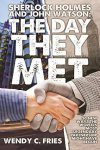 If you lack funds, or bookshelf space, there���s a cool thing you can do that will support that writer with sales (and therefore income) and still give you a chance to read the book (or not read it, as the case may be).
If you lack funds, or bookshelf space, there���s a cool thing you can do that will support that writer with sales (and therefore income) and still give you a chance to read the book (or not read it, as the case may be).
GO TO YOUR LOCAL LIBRARY AND REQUEST IT.
In fact, I���ve just done that with The Day They Met. (Despite the fact I already have the e-book and have the paperback coming!)
I went to my local library, found out how to request books, then I logged in and I asked for that book! I used all the necessary details I could find on Amazon (Full title, publisher, publication date, ISBN etc) and put that in the system and said HIT ME UP WITH THIS AWESOME SHERLOCK HOLMES BOOK, IT���S WHAT MY TAXES PAY FOR BABY, GIMME GIMME GIMME. Only in more formal language.
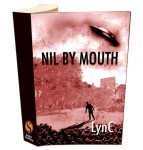 You can even do this if you already own the book, because it’s a great way to help people who do not know and love your friend to be exposed to their work. This can be especially important if their book is not your cup of tea – people who really love that��lapsang souchong stuff are out there this minute, scouring libraries for their delicious beverage of choice!! HELP THEM FIND IT!!
You can even do this if you already own the book, because it’s a great way to help people who do not know and love your friend to be exposed to their work. This can be especially important if their book is not your cup of tea – people who really love that��lapsang souchong stuff are out there this minute, scouring libraries for their delicious beverage of choice!! HELP THEM FIND IT!!
Hell, if you can, go to your siblings��� libraries, your parents��� library, your school or uni, GO TO ALL THE LIBRARIES AND ASK THEM TO GET IT IN FOR YOU.
This sells books for publishers and authors. This exposes books you love to wider audiences who may not hear of it otherwise but might see it on the shelf or in a search.
Feedback Do’s and Don’ts
Of course your writer friend would love to know that you loved the book but… yeah, sometimes you don’t. What to do?
Well, don’t lie. Dishonesty isn’t a great thing, and it’s a downhill road for a friendship. (Especially when you might feel you’re expected to support your gushing with quote from favourite bits.
(And here’s a word of advice for writers ��� don’t ask people what they thought of the book. If they love you but they don’t love your book, it puts both of you in an awkward position. Here is the only occasion on which Don’t Ask/Don’t Tell is an acceptable policy.)
However, you can say how proud you are of your friend, or comment on how great they must feel. Comment on the effort if not the words in question.
And for goodness’s sake, if you spot an error in the text, a typo or a factual error in the final published work, DON’T SAY ANYTHING.
There will be plenty of people who have no emotional investment in the personal relationship who won’t hesitate to bring those things up. The thing to remember is that you are supporting a friend here, and errors that have slipped through the editing and proofreading and all those things to be in the final product are there for keeps now. The book has been published. It’s too late to fix them. You can’t recall the entire print run to fix a bloody typo! Leave it to those whose job it is to review and critique to do that. Chances are your writer has already seen that goddamned typo on page 47 and is praying like billy-o that no-one else has noticed. Don’t be the one to burst their hapless bubble.
Reviews!
If, on the other hand, you really really loved the book, and you have honest to god things to say about it ��� by all means, give some�� encouraging feedback or, better yet – write a review. On Amazon, Goodreads, on your blog, whatever site is selling the book. Reviews help people who are, once more, looking for their particular literary beverage, find that book and decide whether or not to buy it. You don’t have to write a long analysis, though if you feel it’s in you, go for it.
(I should add here that there are many books I’ve loved but not reviewed because my time is finite, so lack of feedback on my part is not necessarily lack of literary love. Just lack of literal time.)
Support means you get new work by writers you love!
 And whether or not you know the writer, if you love a book, support it. Spruik it and review it and share the love, because the noise-to-signal ratio out there is high, and every little boost helps. Very few of the thousands of writers out there make a living out of writing fiction. Help a few of them at least make enough to buy a celebratory cupcake.
And whether or not you know the writer, if you love a book, support it. Spruik it and review it and share the love, because the noise-to-signal ratio out there is high, and every little boost helps. Very few of the thousands of writers out there make a living out of writing fiction. Help a few of them at least make enough to buy a celebratory cupcake.
More importantly, good reviews and good sales will encourage them to write another book, and encourage publishers to publish it as well, so you can enjoy a new book by the writer you love! EVERYBODY WINS!
In short ��� support every writer whose books you love. Especially new writers, those out there for the very first time.
SPREAD THE WORD.
SPREAD THE LOVE.
Some hot recommendations
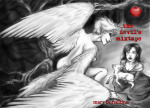 These are books by people I know, and like and love – and whose books I do, in fact, love. I’ve bought said books in paperback and in ebook form (and in both when they’re available sometimes). I’ve reviewed them on Amazon and Goodreads (or this blog) and I’ve asked my local library to get copies in. And now here I am, spreading the word and spreading the love.
These are books by people I know, and like and love – and whose books I do, in fact, love. I’ve bought said books in paperback and in ebook form (and in both when they’re available sometimes). I’ve reviewed them on Amazon and Goodreads (or this blog) and I’ve asked my local library to get copies in. And now here I am, spreading the word and spreading the love.
And remember my motto – I may be biased, but that doesn’t mean I’m wrong!
The Day They Met by Wendy C Fries – 50 short stories on alternative ways Sherlock Holmes and John Watson may have met. Each and every story a gem, and many that had me laughing madly on the tram to work.
Mind the Gap by Tim Richards – a fantasy action-adventure with Egyptology, dreamscapes and trains. Snappy pacing, real serial-adventure with cliffhangers stuff and engaging characters.
Nil By Mouth by LynC – one man’s experience of an alien invasion of earth. Thoughtful, unexpected, human, compassionate, horrifying and deeply humane in turns.
The Devil’s Mixtape by Mary Borsellino – Part horror story, part declaration of love for non-conformists, especially those who embrace being outside the norm.
f2m: The Boy Within by Hazel Edwards and Ryan��Kennedy, the story of a transgendered boy learning how to be true to himself.
Take this opportunity to support the writers you love and tell me your hot recommendations!
Narrelle M Harris is a Melbourne-based writer. Find out more about her books, smartphone apps, public speaking and other activities at www.narrellemharris.com.


